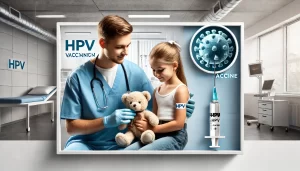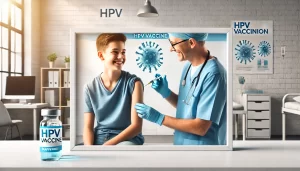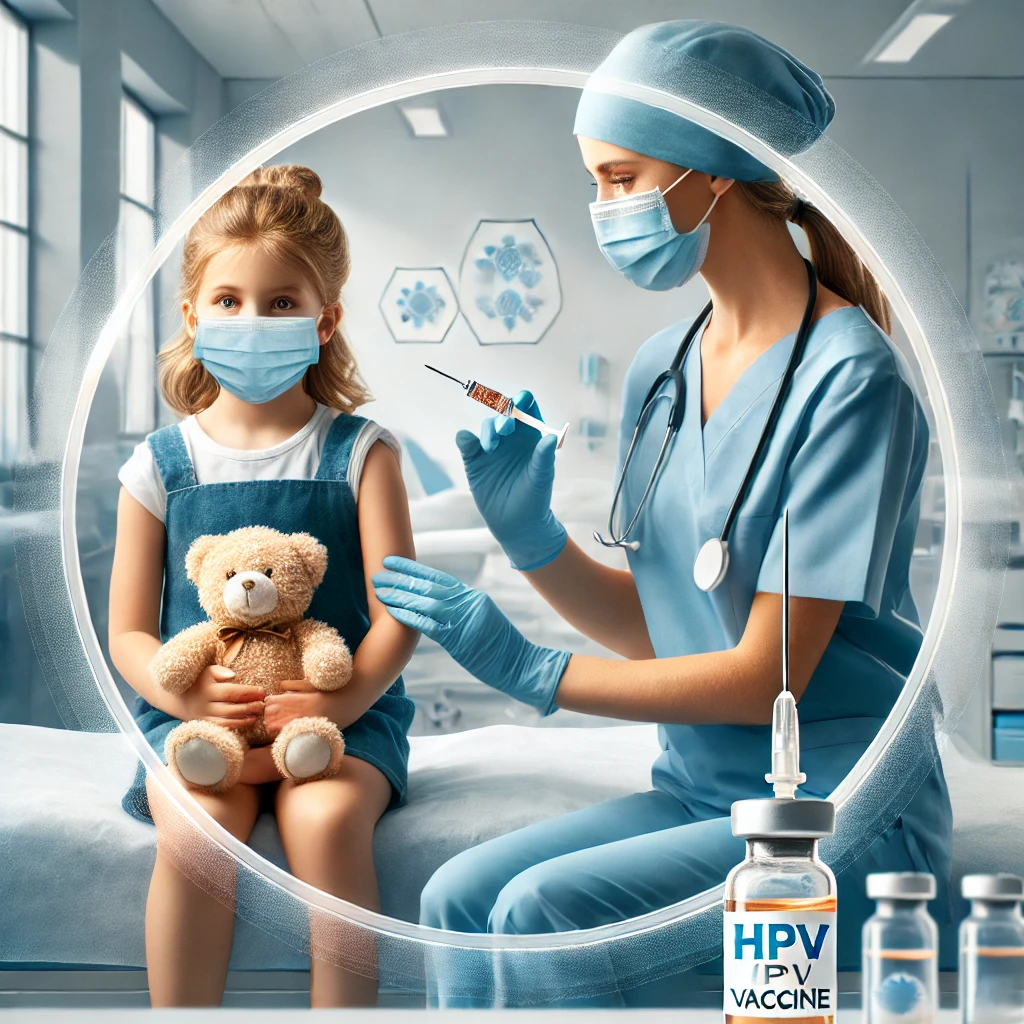1. What is HPV?
HPV, or human papillomavirus, is a group of viruses. There are over 100 types. Some infect the skin, while others affect areas like the mouth and genitals. Different types of HPV can cause various issues, such as cancers in the mouth, throat, anus, cervix, vulva, and penis, or warts in the genital area.

2. What is the current situation of cervical cancer in India?
The current estimates indicate approximately 132,000 new cases diagnosed and 74,000 deaths annually in India, accounting to nearly 1/3rd of the global cervical cancer deaths.
Indian women face a 2.5% cumulative lifetime risk and 1.4% cumulative death risk from cervical cancer.
3. What is the main cause of cervical cancer?
Almost all cases of cervical cancer are caused by infections with certain high-risk types of human papillomavirus (HPV). Thirteen types of HPV are linked to cervical cancer and other cancers, such as those of the anus, penis, vulva, vagina, and throat. Among these, types 16 and 18 are the most common.
4. How common is HPV?
Over 90% of sexually active men and 80% of sexually active women will be infected with HPV at some point in their lives. About 50% of these infections involve high-risk types of HPV that can lead to cancer. However, in most cases, the body clears the infection on its own and it does not result in cancer.
5. How serious is HPV?
HPV is a serious issue. Each year, there are 132,000 new cases of cervical cancer attributed to HPV in women, with 74,000 resulting in death. Right now, about two-thirds of Indian women with cervical cancer will die from it. This means many are being diagnosed when the cancer is already advanced and that preventive services are not reaching most girls and women. HPV is also linked to over 90% of anal cancers, as well as most cases of penile cancer and cancers of the mouth and throat. Among men, cancers of the mouth and throat are the most common HPV-related cancers, and research shows that infection rates are increasing.
6. What kills HPV naturally?
There’s no cure for HPV itself, but its symptoms can be treated. If you have HPV, it’s important to practice safe sex to avoid spreading it.
7. Are there are any symptoms after HPV infection?
Most people who get HPV don’t realize it until they notice some changes.
8. What does HPV vaccine do?
Most of the time, the body can find and clear out HPV. But if the virus stays in the body for a long time, it can cause cancer. Getting vaccinated against HPV helps prevent cancer in men and women. The HPV vaccine helps protect against genital warts and most cervical cancers. It also guards against cancers of the vagina, vulva, penis, anus, mouth, throat, head, and neck caused by HPV. The vaccine trains the body’s immune system to recognize and fight certain HPV strains. This makes it easier for the body to clear the virus if you come into contact with it later.
9. How is HPV spread?
HPV is most commonly spread through oral, vaginal, or anal sex with an infected person. It can also be transmitted through skin-to-skin contact with areas infected by HPV. Since HPV can be present without any symptoms, a person can unknowingly pass it on to others.
10. Can we treat HPV infection?
There is no cure for HPV infection itself, but the body usually clears the virus on its own. If the infection persists and causes complications like cancer, various treatments are available. These treatments include removing genital warts or pre-cancerous cervical cells, and using chemotherapy, surgery, or radiation for cancer
11. Which are the vaccines available against the HPV in India?
In India, the available HPV vaccines are: 
1. Bivalent (Cervarix): Protects against HPV types 16 and 18.
2. Quadrivalent (Gardacil and Cervavac): Covers HPV types 6, 11, 16, and 18.
3. Nonavalent (Gardacil-9): Protects against HPV types 6, 11, 16, 18, 31, 33, 45, 52, and 58. This vaccine is expected to increase protection against cervical cancer by about 15%.
The Bivalent and Quadrivalent vaccines are expected to prevent around 83% of HPV related cervical cancers, while the Nonavalent vaccine is expected to prevent approximately 98%. All three vaccines are highly effective in preventing cancers caused by the HPV types they cover.
12. Who should receive this vaccine?
The HPV vaccine is recommended for all girls and boys aged 9 and older, as well as adolescent girls and boys. Vaccination is routinely recommended through the age of 26 for all males and females, Catch-up vaccination may be offered to women up to 45 years old.
13. Can males receive this vaccine in India?
Yes, males can receive the HPV vaccine in India. Vaccination helps protect against HPV- related cancers of the penis, anus, and oropharynx (mouth and throat). Currently, in India, only the HPV 9 vaccine and the new Cervavac vaccine by the Serum Institute of India are approved for use in males (Cervavac up to 26 years of age and HPV 9 up to 45 years). Vaccination is recommended for males up to 26 years old. Although there are no specific studies in India for males older than 26, the vaccine can be considered for those who wish to receive it based on global research, which supports its use up to age 45.
14. Why vaccinate preteens and teens against HPV?
The vaccine is more effective at preventing infections when received at a younger age. For HPV, it’s especially important to get the vaccine before the first sexual experience as they will be HPV naive
15. Are HPV vaccines safe?
Yes, HPV vaccines are generally safe. Most side effects are mild to moderate and include pain, swelling, or redness at the injection site. Some adolescents may experience dizziness or fainting after receiving the vaccine, but this can be minimized by administering the vaccine while the person is lying down or reclining. It’s important to monitor all patients for at least 20 minutes after vaccination to check for immediate side effects. These reactions are not unique to the HPV vaccine and can occur with any vaccine in this age group.
16. Who should not receive this Vaccine?
The HPV vaccine should not be given to:
1. Individuals who have had a severe allergic reaction (anaphylaxis) to a previous dose of the vaccine or to any component of the vaccine.
2. Pregnant women.
3. Individuals who are moderately or severely ill should wait until they have recovered before getting the vaccine.
17. Is HPV vaccine effective?
The vaccine is very effective at protecting against the HPV types it targets. Since the introduction of the HPV vaccine, there has been a noticeable decrease in HPV infections among teenage girls and young women. It has also led to fewer cases of genital warts, pre-cancerous changes in the cervix, and other HPV-related complications.
18. What are the latest HPV vaccination guidelines from the WHO’s Strategic Advisory Group of Experts (SAGE)?
The World Health Organization (WHO) now recommends:
1) A one or two-dose schedule of HPV vaccination for girls aged 9-14.
2) A one or two-dose schedule for girls and women aged 15-20.
3) Two doses with a 6-month gap for women over 21.
19. Will a single dose of the HPV vaccine offer the same protection against cervical cancer as multiple doses?
The WHO’S Strategic Advisory Group of Experts on Immunization (SAGE) found that a single dose of the HPV vaccine works as well as two or three doses. This means even one dose can offer strong protection against HPV, which causes cervical cancer. This could make it easier to get more girls vaccinated and help prevent the disease more effectively.
20. Which vaccines are approved for administration as a single dose?
Gardasil, Gardasil 9, and Cervarix are globally approved for single-dose administration. Currently, research is being conducted to assess the efficacy of single-dose administration for the Indian vaccine, Cervavac.
21. Which group of population should avoid receiving just a single dose of the HPV vaccine?
Immunocompromised individuals, including those with HIV, should ideally receive three doses of the HPV vaccine. If that’s not possible, they should get at least two doses. These individuals should not receive just a single dose of the HPV vaccine, as there is no evidence supporting its effectiveness for this group.
22. Can a woman over 26 years old receive the HPV vaccination?
Yes, she can, provided she can afford it up to the age of 45.
23. What is the efficacy of the vaccine in older women?
The vaccine’s efficacy in older women ranges from 80-85%, with the highest effectiveness observed when given to adolescents before the sexual experience.
24. Is it advisable to recommend an HPV DNA test before receiving the vaccine?
While it’s possible to suggest an HPV DNA test, there is no official recommendation to perform it before vaccination.
25.Can a woman who tests positive for HPV DNA still receive the HPV vaccination?
Yes, the vaccine can still be offered to women up to age 45, regardless of test results. As most people get HPV shortly after they become sexually active. Even if you have one strain of HPV, you can still benefit from the vaccine, as it can protect you from other strains you don’t have yet. However, none of the vaccines can treat an existing HPV infection. They only protect against specific HPV strains that you haven’t been exposed to.
26. What percentage of cervical cancers can be prevented by HPV vaccination?
The HPV vaccination can prevent up to 90% of cervical cancers, though about 10% of cases may be HPV-independent.
27. Do women who have received the HPV vaccine still need to undergo cervical cancer screening?
Yes, even if you’ve had the HPV vaccine, you still need cervical cancer screening starting at the age of 25-30, regular screening is important to check for cervical cancer and pre cancer. If you notice any signs of cervical cancer, like bleeding after sex, between periods, or after menopause; pelvic pain; see a doctor right away. Screening should be done till the age of 65 years.
28. Can we offer a single dose of the HPV vaccine to males?
No, we cannot offer a single dose of the HPV vaccine to males yet, as there is no official approval supporting its effectiveness for them. We should continue with the existing schedule: 2 doses, 6 months apart, for boys and adolescents under 15 years old, and 3 doses at 0, 1, and 6 months (for the bivalent vaccine) or 0, 2, and 6 months (for the quadrivalent or nonavalent vaccines) for males aged 15 to 26. A single-dose regimen may be used off-label for boys aged 9 to 20 years. Immunocompromised males and those living with HIV should receive 3 doses ideally.

Written by
Dr. Haritha Maddirala
Gynaec Oncologist
Mahatma Gandhi Cancer Hospital and Research Institute, Visakhapatnam







